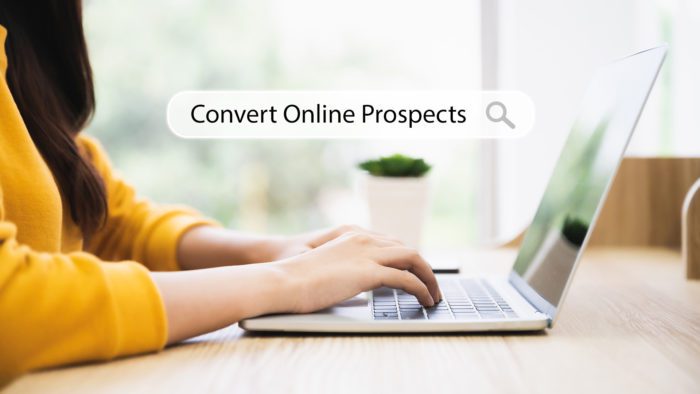Your SEO, evergreen content, social media presence, and online advertisements are working. So online prospects are visiting your website. Traffic means you’re generating interest, which is always good. But are you also generating sales from your online prospects?

All the clicks in the world won’t matter if you’re not converting the people behind them into customers. So, how do you ensure the people visiting your website will stick around long enough to buy — or at least give you the contact information you need to add them to your pipeline? Here are 6 expert tips to help you prevent those online prospects from disappearing into the world wide web.
1. Find The Right Audience.
If you’re getting clicks, your content is appealing to somebody. But is it finding the people you want to convert? To turn traffic into sales, you must understand your audience well enough to know what they want to read and watch. If the wrong eyeballs keep finding your content, you’re providing a free service without any benefit to your business.
So, it’s not enough for your law office to include legal topics on your website — they must be topics your potential clients will want to read. Content that will primarily appeal to other attorneys may be helpful, but it probably won’t result in your firm taking on any new cases. Ensure your content is targeted and accessible to the people you’re hoping will hire you.
2. Always Add Value.
How often have you clicked on an article, then clicked away when you realized the content wasn’t what you thought it would be? Clicks are meaningless unless your online prospects are sticking around. So, your content has to provide value by being comprehensive and easy to read. A too-brief topic summary will leave readers searching for better answers on other websites. And a giant wall of text will prevent many people from reading a word. Style and substance both matter.
Providing value is also essential to securing the contact information you need to place online prospects into your sales funnel. Gated content helps gather online prospects, but people won’t hand over their email addresses unless they want whatever is on the other side. If your e-book isn’t generating the lead you hoped, you might have to consider alternatives like free consultations or discount offers. You can also get creative and offer micro-courses, quizzes, or calculators that appeal to your target audience.
3. Strategically Place CTAs.
Your call to action (CTA) button must be clear, concise, and present where users are most likely to click. Consider your current CTA placement. You probably have a CTA button “above the fold” in your website’s header. But people who came to see your content likely won’t linger there. They’ll keep scrolling and barely register your CTA.
So, your CTA must be where your visitors are. Sticky ads or anchor ads are less intrusive and obnoxious than pop-ups but keep your CTA front and center. Floating bars are a similar option. Calls to action in the middle of a page are also becoming more popular. They’re usually presented as a dynamic but standalone portion of the page with borders and unique colors to ensure readers aren’t confused. And crucially, don’t forget to provide a compelling CTA at the end of your content. Now that your web visitor has what they came for, you need to give them a reason to stick around.
4. Experiment With Exit Pop-Ups.
Have you ever added something to your cart and changed your mind? If so, there’s a good chance you’ve come across an exit pop-up offering you an additional discount if you continue with your purchase. They’re annoying, but there’s a reason so many companies use exit pop-ups — they work.
So, give them a try. But be careful with your implementation. These pop-ups should only appear at strategic points, not when someone is in the middle of reading an article or, even worse, after they’ve already converted. You’ll probably see an increase in conversions. That said, the pop-up should be a last resort. If your exit pop-up box works too well, you may want to consider ways to improve your website to convert online prospects sooner.
5. Utilize Live Chat.
No matter how intuitive your website is, there will always be a potential customer who can’t quite find what they’re looking for. Some people also have specific questions that you wouldn’t necessarily think to add to your website. These online prospects will quickly move on to a different business unless there’s a fast, easy way to get their answer.
That’s where live chat comes in. It’s increasingly popular, and many customers expect it. Live chat allows you to interact with online prospects in real time and answer their questions. In the meantime, you can also qualify your leads. And unlike a static webpage, live chat allows you to respond to objections and correct misconceptions before they cost you a sale.
6. A/B Test Different Methods.
Let’s face it: Nothing works for everyone. Different businesses see different levels of success with the same methods for various reasons. But you can reduce the risk of investing in a strategy that won’t pay off by employing A/B testing.
A/B testing directs users to different versions of your website without them knowing it. One may be your current website, while another is a redesign. Or you might try A/B testing with two redesign options, a floating bar versus a sticky ad, or two different CTAs. Once you collect data on which version produces a better conversion rate, you can implement it permanently, tailor-made to your online prospects. The secret is to stay curious and constantly try to take your website to the next level. Keeping it interesting will make your online prospects more likely to stick around so you can nurture them into paying customers.






